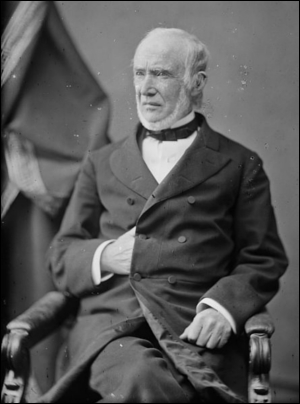1804-1884
Charles O’Conor was born on January 22, 1804, in New York City, the son of a rebel who fled to America following the failed United Irishmen uprising of 1798. His childhood was impoverished and he had little formal education but he decided to study law. His first two clerkships were in the offices of “ne’er-do-well” lawyers, but his third clerkship was with an attorney who had a good law library. O’Conor studied all five volumes of Comyn’s Digest of the Laws of England and mastered the principles of English common law. In 1824, he was granted the right to try cases before the Court of Common Pleas and three years later, in 1827, he was admitted to the bar of the Supreme Court of Judicature and the Court of Chancery.
A highly controversial figure throughout his life, Charles O’Conor was recognized as an excellent lawyer — his reputation was established early in his career when he represented St. Peter’s church against the challenge of two trustees defeated in a recent election. Thomas Addis Emmet represented the defeated trustees. Eventually, the case reached the New York Supreme Court of Judicature and, against the expectations of the legal community, the Court decided in favor of O’Conor’s clients.
In the early 1840s, O’Connor sponsored and mentored a young man named John McCunn, who held office as a New York City judge during the Civil War and was subsequently one of the New York Supreme Court justices impeached in the Tammany Hall scandal.
O’Conor was a doctrinaire Democrat who, as a delegate to the 1846 New York Constitutional Convention, opposed all changes, including the extension of suffrage to African Americans and the proposal to allow married women to own property. In 1852, he was a presidential elector on the Democratic ticket, voting for Franklin Pierce, and was appointed United States Attorney for the Southern District of New York from 1853 to 1854.
As an extreme States’ rights Democrat and a supporter of slavery, he represented the slave owners in Jack v Martin and in the Lemmon Slave Case. Following the American Civil War, he became senior counsel for Jefferson Davis during his indictment for treason.
As counsel, he was involved in several celebrated cases of his day including the Lispendard will suit and the Forrest divorce case. O’Conor also took a prominent part in the prosecution of Boss Tweed and members of the “Tweed Ring” and later published Peculation Triumphant, Being the Record of a Five Years’ Campaign against Official Malversation, A.D. 1871-1875 (1875).
In 1881, he moved to Nantucket, Massachusetts, where he died in 1884.
Sources
Christian Herald. The World-wide Encyclopedia and Gazetteer, Vol 11 (1908)
Charles Kendall Adams, Rossiter Johnson. Universal Cyclopedia and Atlas, Vol 8 (1902)
Day Otis Kellogg, Thomas Spencer Baynes, William Robertson Smith, eds.
The Encyclopædia Britannica: New American supplement (1903)

